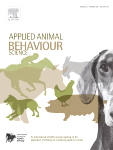Type de document : article scientifique publié dans World Journal of Veterinary Science, 2020, 8, 4-8
Auteur : Tom Ahern
Résumé en français (traduction) : Un certain nombre d’études ont été menées sur les différents types et l’incidence des comportements indésirables liés au transport chez les équidés. Une formation inadéquate ou mal exécutée était l’un des nombreux facteurs humains qui étaient considérés comme contribuant à ces comportements. L’attention du conducteur, la distance parcourue, l’orientation de l’animal et le type de véhicule en sont d’autres. Ce qui n’a pas été étudié, c’est la possibilité que certaines conditions médicales puissent contribuer à l’incidence de ces comportements problématiques. L’impact des conditions médicales impliquant une douleur neuropathique et d’autres où des antécédents d’instabilité des voies aériennes supérieures étaient évidents a été discuté. L’importance d’obtenir un historique complet englobant tous les cas d’altération du comportement et pas seulement ceux directement liés au transport a été soulignée. Dans le cas de maladies associées à des comportements altérés, il existe souvent un ensemble qui peut inclure des éléments des comportements difficiles liés aux transports.
Résumé en anglais (original) : There had been a number of studies into the various types and incidence of transport-related problem behaviours in equids. Inadequate or poorly executed training was one of several human factors that were seen to contribute to these behaviours. Driver attention, distance travelled, animal orientation and vehicle type were others. What had not been investigated was the possibility that certain medical conditions could contribute to the incidence of these problem behaviours. The impact of medical conditions involving neuropathic pain and others where a history of upper airways instability was evident were discussed. The importance of acquiring a full history encompassing all incidents of altered behaviour and not just those directly associated with vehicular travel was emphasised. With medical conditions that had associated altered behaviours there were quite often a cluster of these behaviours which could include elements of transport-related problem behaviours.







